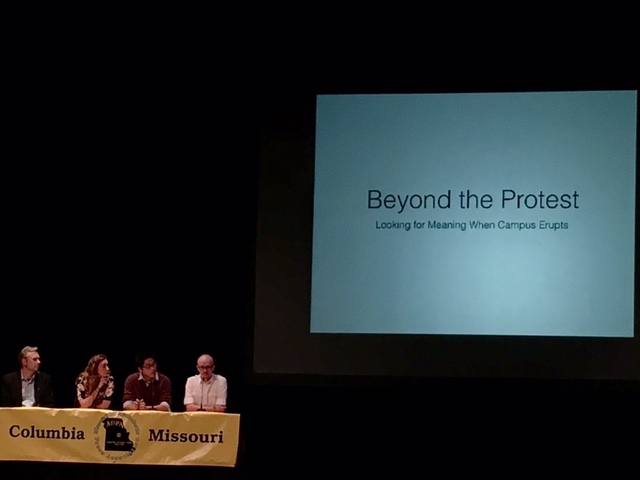The Role of Journalism at Mizzou
Four Journalists Aim to Make a Difference
Protests in response to wars, racism and many other issues have been occurring for years upon years, from protests of the Vietnam War at K-State, where multiple student lives were lost at the hands of the police, to present day occurrences in Baltimore and Ferguson. The media plays a large part in how each event is depicted and how the rest of the country sees the individuals participating. The protests at Mizzou were covered by nearly every type of media, from the community level all the way to the national.
In “Beyond the Protest: Looking for Meaning When Campus Erupts,” four journalists spoke on the institutional racism at Mizzou and the important role journalism played. Timing is everything in journalism, and staying up to date and in the moment played a significant part. “Us journalists, we are first responders. We need to see the world live,” Brian Kratzer, director of photography for the Columbia Missourian and assistant professor said. Being reactionary and knowing what stories to write, rather than just getting assignments and doing your job by the book proves to be a better alternative, according to these speakers.
“You can always make up work from a class, but you can’t make up the history you missed while doing it,” Justin Stewart, photojournalist and photographer for the Columbia Missourian said.These journalists had to put their lives on hold, just to get a story, just to get a picture, just to get a video, all working towards the goal of an accurate depiction with objectivity.
Especially with controversial topics like race, objectivity is vital. Remaining separate from the story and not letting personal opinions get involved can be difficult. “It is a lot of work trying to show the people [protesting] you are just trying to depict their story in the right way,” Stewart said. The speakers discussed how the protesters were very critical of the journalists and assumed they didn’t actually care about the issues, only the story they could get. Asking themselves, as writers, if they were portraying the topic accurately and objectively was important.
Covering stories with such huge emotional baggage can be hard while remaining separate. “I am a white girl in the midwest, I have never been called those things and hearing the evil words spoken, directed at others, changed me as a journalist and a human.” Bell, photo editor at the Columbia Missourian said.


